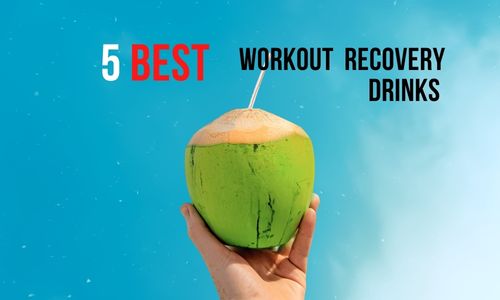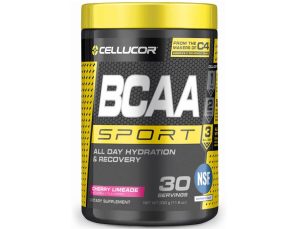Workout is an important part of maintaining a healthy lifestyle, but it can also put a lot of stress on your body. To remove stress as well as grow stronger, it’s a must to provide them with the right nutrients. Workout recovery drinks can help replenish the essential nutrients your body needs to recover, refuel and prepare for your next workout.
After a strenuous workout, drinking water or another hydrating beverage is crucial to restoring your body’s fluid levels. However, finding an enjoyable post-workout drink can be challenging. Here are 5 of the best & most convenient workout recovery drinks for 2023.

What are the key benefits of using Workout Recovery Drinks
Speeds up recovery time: Workout recovery drinks can help reduce muscle soreness and speed up recovery time after intense exercise.
Supports muscle growth: By providing your body with the right nutrients, workout recovery drinks can support muscle growth and help you reach your fitness goals.
Hydrates your body: Many workout recovery drinks also contain electrolytes, which can help hydrate your body and replace any fluids lost during exercise.
Enhances protein synthesis: Workout recovery drinks can help you rebuild and grow your muscles quickly
5 Best Things to Drink After a Workout for Recovery
When it comes to working out, it is essential to not only focus on the workout itself but also the recovery process
Fortunately, some tasty alternatives will help you stay hydrated without sacrificing taste. Keep reading to learn about the best workout recovery drinks you can try.
1. Fruit Smoothies
Fruit smoothies are a delicious way to consume the vitamins, minerals, and fiber that your body needs to recover from workouts. Combined with protein and other nutrients, they also replenish glycogen stores and help restore muscle function.
To make a good smoothie, start with a base of thick and creamy fruits such as mangoes, bananas, avocados, peaches, papayas, and coconut. Then add in frozen fruits, leafy greens, and yogurt or liquid.
Adding fresh fruits and veggies to smoothies is a great way to increase the amount of produce in your diet. They’re a good source of vital nutrients like potassium, magnesium, and vitamin C.
Fruits are a wonderful addition to smoothies because they provide simple sugars that help replenish glycogen stores. This sugar also helps muscles recover quickly after workouts.
2. Sports Drinks
The best workout recovery drinks are a combination of carbohydrates, proteins, and electrolytes. These nutrients help your body restore muscle micro-tears, build strength, and boost performance.
During exercise, your muscles need a quick supply of glycogen to power through tough workouts. Glycogen is a type of sugar in the body that fuels physical activity.
But a hard workout depletes your muscles of this energy source, and you need a sports drink to replenish it quickly after a workout.
Isotonic sports drinks replace fluid lost by sweating and provide carbohydrates in the form of glucose, your body’s preferred energy source. Isotonic drinks are best for athletes who need a small, low-calorie boost of energy to power through high-intensity training.
Best Sports Drink for Hydration & Recovery

Pros
- Can aid in muscle recovery and growth.
- Available in several flavors and is easy to mix with water
- Contains a balanced ratio of BCAAs, which can help support muscle protein synthesis
Cons
- Unnecessary artificial coloring
- Contains artificial sweeteners, which some people may be sensitive to or prefer to avoid
3. Water
Whether you’re an intense cardio junkie or someone who loves heavy weightlifting, it’s crucial that your body recovers from strenuous workouts. A good recovery drink will hydrate your muscles and replenish the glycogen stores they’ve lost during your hard training session.
Water is an excellent choice for post-workout hydration. It’s a great way to avoid dehydration, which can make you feel lethargic and weak after a workout or lead to muscle cramps.
In addition to hydrating your muscles, water helps your body replenish the electrolytes you’ve lost through sweat. These can include sodium, potassium, and calcium.
Water is essential to a healthy diet, so it would be the best workout recovery drink. However, you should choose a quality drink that contains the right nutrients. You don’t want to choose a recovery drink with too much sugar or stimulants.
4. Milk
The best workout recovery drinks provide the right amount of protein, carbohydrates, and electrolytes to repair muscles after an intense workout. These drinks also help restore energy and prevent dehydration.
Milk is a popular choice for post-workout recovery, especially chocolate milk. It has a carbohydrates-to-protein ratio in the range of 4:1, which is ideal for replenishing muscle glycogen and speeding up recovery.
It also has a high water content that replaces sweat loss and prevents dehydration. Plus, it provides calcium and just a small amount of sodium.
Fruit juices are another great option for hydrating after an intense workout. Tart cherry juice, for instance, regulates blood sugar levels and is high in heart-friendly antioxidants.
5. Coconut water
Coconut water is a popular recovery drink due to its high electrolyte content. Electrolytes, such as potassium and sodium, are important for rehydrating the body after exercise and maintaining fluid balance. Coconut water also contains antioxidants and anti-inflammatory properties, which can help to reduce muscle soreness and promote recovery. One cup natural coconut water (245g) provides 44 calories which far surpasses what sports drinks deliver.
In Conclusion
These five workout recovery drinks are just a few of the many options available to help you bounce back from intense exercise. By incorporating one or more of these drinks into your post-workout routine, you can ensure that your body has the nutrients and support it needs to recover and perform at its best. But never forget to listen to your body and consult with a healthcare professional if you have any concerns or questions about your recovery regimen.

